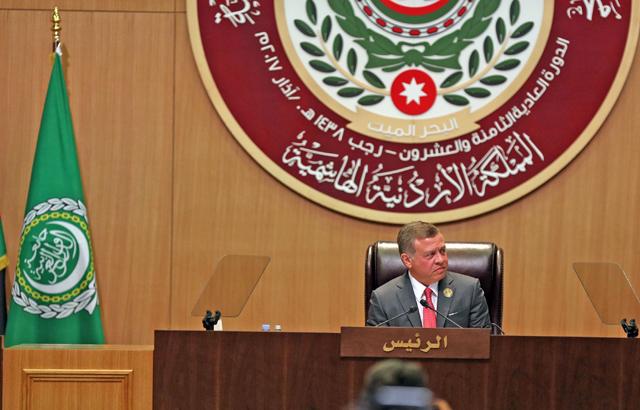You are here
Pundits commend ‘key successes’ brought by Arab summit
By Mohammad Ghazal - Mar 30,2017 - Last updated at Mar 30,2017

His Majesty King Abdullah presides over the 28th Arab League summit at the Dead Sea (Anadolu Agency photo)
AMMAN — The clear and unified Arab message regarding the Mideast peace process, the high-level of attendance by Arab leaders, and the reconciliation between Arab leaders were key achievements of the Arab summit hosted on Wednesday by Jordan.
Pundits interviewed by The Jordan Times said the summit succeeded in repositioning the Palestinian issue as a top priority for Arab states despite challenging regional conditions, combined with highly sophisticated issues and busy agendas.
The presence of 15 heads of Arab states, amidst unprecedented attendance by officials from the US, the EU and the UN, among others, was a key accomplishment for the summit, during which Jordan succeeded in facilitating reconciliation and enhancing ties among a number of Arab states.
"This is one of the best summits held since the start of the Arab Spring… High-level representation of Arab states, and the attendance of kings, emirs, and presidents of many Arab states is in itself a success, in light of regional conditions," Oraib Rantawi, head of Al Quds Centre for Strategic Studies, told The Jordan Times Thursday.
He commended the consensus reached on the two-state solution to the Palestinian-Israeli conflict, as well as the unified and direct message sent to the US administration regarding the rejection of any attempts to relocate the US embassy in Israel from Tel Aviv to Jerusalem.
“There was also a consensus concerning Iraq… In addition, the summit succeeded in sending an unambiguous call for a political solution to the Syrian crisis… At previous summits, there were calls on Syrian President Bashar Assad to step down, in other summits, the Syrian opposition was present. At this summit, the Syrian flag and the symbols of Syria as a state were present instead,” he added.
Rintawi highlighted the importance of bilateral and trilateral meetings held between Arab heads of state on the sidelines of the summit, including those between His Majesty King Abdullah, Palestinian President Mahmoud Abbas and Egyptian President Abdel Fattah Al Sisi, between Saudi King Salman and Al Sisi, as well as the meeting between Emir of Kuwait Sabah Al Ahmad Al Sabah and Iraqi Prime Minister Haider Abadi. The analyst described these encounters as “successful achievements that the summit takes credit for”.
Political analyst Hassan Barari praised the outcome of the summit.
“Jordan succeeded in hosting the summit. And the King, the foreign minister, and the protocol team did a great job,” Barari commented in a Facebook post.
Barari commented on critics of the summit, saying: “Those people are never delighted with anything.”
“I wish that those who did nothing but criticise the summit [would] suggest one solution to each problem they referred to…It does not mean that the summit will solve everything as there are limitations and restrictions that are imposed by the balance of power that Jordan cannot overcome,” Barari explained.
Jamal Al Shalabi, a professor of political science at the Hashemite University, said the attendance of influential Arab leaders was a success for the summit.
“At the time when there are differences, sectarianism and troubles in the Arab world, the gathering of Arab leaders to discuss pressing issues is by itself an achievement,” said Shalabi.
Arab leaders sent a message about their unity and solidarity on various issues, especially regarding the two-state solution, he said, adding that, with their commitment to the Arab Peace Initiative, the leaders also sent a message to Israel to accept what the overture offers it, including normal ties with Arab states.
Another message was sent to Tehran, he said, as Sunni Arabs united in the face of any Iranian interference in their affairs.
“The meetings held on the sidelines of the summit were important, and I believe that there will be follow-up meetings between some Arab states as a result of the discussions held during the Arab summit,” said Shalabi.
Related Articles
AMMAN — Arab leaders’ stand in support of Jordan's Department of Jerusalem Awqaf as the sole legal entity to administer Al Haram Al Sharif/A
DEAD SEA — The 28th Arab summit sends a message to the entire world on the Arabspursuit of peace and stability, a senior official said on Su
DHAHRAN—His Majesty King Abdullah arrived in Saudi Arabia on Sunday to participate in the 29th Arab League Summit.As a chair of the 28th Ara














